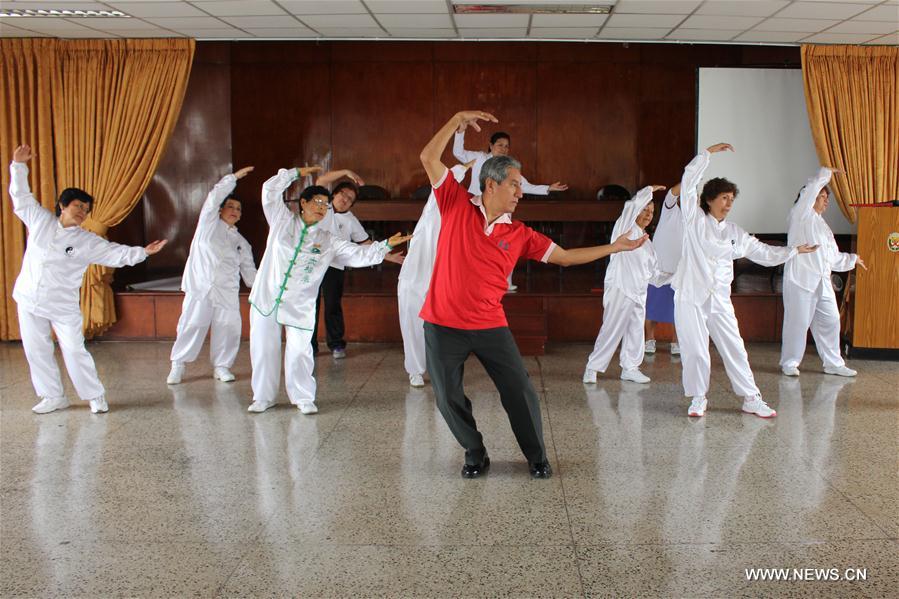
Image taken on Nov. 5, 2016 shows director general of the Police Hospital "Augusto B. Leguia" in Lima, Orlando Leiva Meza (C), taking part in a Tai Chi (shadowboxing) session in the hospital's climacteric program, in Lima, Peru. Growing up in Peru, Orlando Leiva Meza developed a fondness for Chinese cuisine and martial arts. But it was his decision to become a traditional Chinese medicine doctor that has cemented his ties with China. "It would very much help to strengthen the practice of traditional Chinese medicine, especially acupuncture," said Leiva, who is currently director general of the Police Hospital in Lima, stressing that he would like to see greater cooperation between China and Peru in the field of health. (Xinhua/Luis Camacho)
LIMA, Nov. 12 (Xinhua) -- Growing up in Peru, Orlando Leiva Meza developed a fondness for Chinese cuisine and martial arts. But it was his decision to become a traditional Chinese medicine doctor that has cemented his ties with China.
"It would very much help to strengthen the practice of traditional Chinese medicine, especially acupuncture," said Leiva, who is currently director general of the Police Hospital in Lima, stressing that he would like to see greater cooperation between China and Peru in the field of health.
After he and his wife, Ana Rioja, got their degrees in medicine from the Greater National University of San Marcos in Lima, they decided to pursue postgraduate studies in traditional Chinese medicine.
They won scholarships from the Chinese government in 1986 and headed to China.
China and Leiva were destined to meet. When he was a young boy of 15, he was such a fan of martial art films that he called himself Da Long, or Big Dragon. Years later, he named his firstborn Xiao Long, or Little Dragon.
Traditional Chinese medicine has several branches, including herbal medicine, but "among all these fields, the one that impressed us most, that motivated us most, was learning about acupuncture," Leiva said in a recent interview with Xinhua.
Leiva arrived in Beijing knowing nothing of the language, except "tay pa," a term popularly used at Lima's many Chinese restaurants to ask for a "generous serving."
"The first thing I had to learn in China was the language. Of course, we studied the language oriented to health ... and then we began to learn traditional medicine in all its scope, but especially acupuncture," he said.
Leiva spent two years at the Beijing Institute of Traditional Chinese Medicine and one year as an intern at Shanghai's Longhua Hospital, affiliated to Shanghai University of Traditional Chinese Medicine.
While living in Beijing, he became intrigued by the sight of hundreds of people of all ages practicing Tai Chi in parks and other public spaces. He soon joined them and learned 18 basic steps, the flow of movements and breathing.
When Leiva and his wife returned to Peru, they began to practice traditional Chinese medicine, which they found can benefit the medical community there.
"An educational process began, because it was new to the national (health authorities)," he said.
As interest in the field grew, they began to work with courses at Peru's Medical College, said Leiva.
These seminars in public health eventually led to the publication of a book, along with Rioja and Dr. Clara Liau-Hing, on basic acupuncture and Tai Chi.
Leiva has applied his knowledge mainly to patients suffering from chronic pain and rheumatism, as well as other afflictions, such as cardiovascular or gastrointestinal ailments, migraine and insomnia.
Leiva also educates local people about the benefits of Tai Chi, giving five 10-week courses a year.
Leiva's family ties with China are growing. His oldest son, Pedro, 27, who was born in Beijing, is today studying for a master's degree in international business and trade in China.
With his daughter Zoila, 24, and his wife, Leiva has returned to China on five occasions over the past 27 years, three times for medical courses and twice as tourists.











